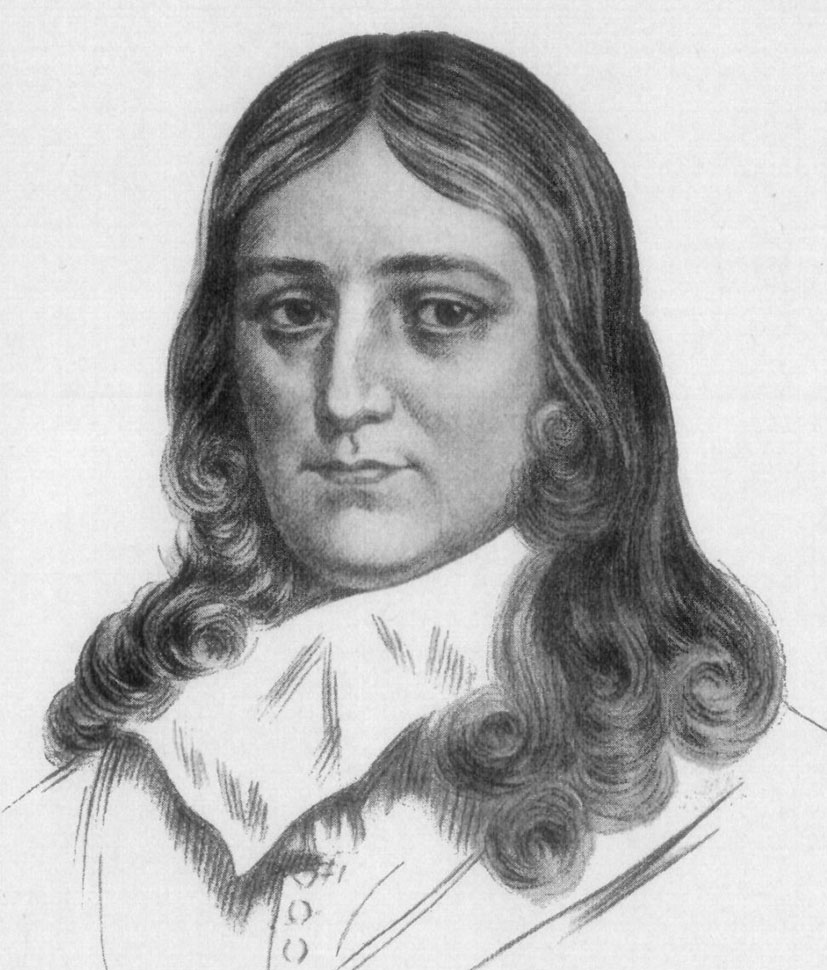John Milton
(1608 - 1674)

Milton writing poetry could never fail in a certain
greatness and power, nor could he descend below
his well-attained poetical level.
SRI AUROBINDO
from Paradise Lost
(I.1-26)
Of man’s first disobedience, and the fruit
Of that forbidden tree, whose mortal taste
Brought death into the world, and all our woe,
With loss of Eden, till one greater Man
Restore us, and regain the blissful seat,
Sing, Heav’nly Muse, that on the secret top
Of Oreb, or of Sinai, didst inspire
That shepherd who first taught the chosen seed
In the beginning how the heav’ns and earth
Rose out of Chaos; or if Sion hill
Delight thee more, and Siloa’s brook that flowed
Fast by the oracle of God, I thence
Invoke thy aid to my advent’rous song,
That with no middle flight intends to soar
Above th’Aonian mount, while it pursues
Things unattempted yet in prose or rhyme.
And chiefly thou, O Spirit, that dost prefer
Before all temples th’ upright heart and pure,
Instruct me, for thou know’st; thou from the first
Wast present, and with mighty wings outspread
Dove-like sta’st brooding on the vast abyss
And mad’st it pregnant: what in me is dark
Illumine, what is low raise and support;
That to the highth of this great argument
I may assert Eternal Providence,
And justify the ways of God to men.
Sri Aurobindo’s remarks:
«Certainly, Milton in the passages you quote had a rhythmical effect in mind; he was much too careful and conscentious a metrist and much too consummate a master of rhythm to do anything carelessly or without good reason. If he found his inspiration stumbling or becoming slipshod in its rhythmical effects, he would have corrected it.»
«Paradise Lost […] is the one supreme fruit of the attempt of English poetry to seize the classical manner, to achieve a poetical expression disciplined by a high intellectual severity and to forge a complete balance and measured perfection of form.
Paradise Lost is assuredly a great poem, one of the fine great epical poems of European literature, and in certain qualities it reaches heights which no other of them had attained, even though as a whole it comes a long way behind them. Rhythm and speech have never attained to a mightier amplitude of epic expression and movement, seldom to an equal sublimity.»
«When Milton writes
Fall’n Cherub, to be weak is miserable,
or describes the grandeur of the fallen archangel, there is a vital force there that is of the highest quality […]. The vital energy makes the soul stir within you.»
«Milton’s “grand style” is such a substitute for the manner of the higher Thought. Take it anywhere as its ordinary level or in its higher elevation, there is always or almost always that echo there:
Of man’s first disobedience, and the fruit
Of that forbidden tree
or
On evil days though fall’n, and evil tongues
or
Blind Thamyris and blind Maeonides,
And Tiresias and Phinesu, prophets old,
[…] Milton architecture of thought and verse is high and powerful and massive, but there are usually no subtle echoes there, no deep chambers: the occult things in man’s being are foreign to his intelligence, — for it is in the light of the poetic intelligence that he work.»
«The old poets depended greatly on the metrical fall, made much of the external mould and its possible excitement of the thing that possessed them and moved them to speech. […] Milton’s
Those thoughts that wander through Eternity,
or any of his stately rolling lines or periods of organ music will do for a great illustration.»
«Milton has very usually (in Paradise Lost) some of the largeness and rhythm of the Higher Mind, but his substance is — except at certain heights — mental, mentally grand and noble.».
from Paradise Lost
(II.134-151)
Or could we break our way
By force, and at our heels all hell should rise
With blackest insurrection, to confound
Heav’n purest light, yet our great Enemy
All incorruptible would on his throne
Sit unpolluted, and th’ ethereal mold
Incapable of stain would soon expel
Her mischief, and purge off the baser fire,
Victorious. Thus repulsed, our final hope
Is flat despair; we must exasperate
Th’ almighty Victor to spend all his rage,
And that must end us, that must be our cure,
To be no more. Sad cure! for who would lose,
Though full of pain, this intellectual being,
Those thoughts that wander through eternity,
To perish rather, swallowed up and lost
In the wide womb of uncreated Night,
Devoid of sense and motion?
